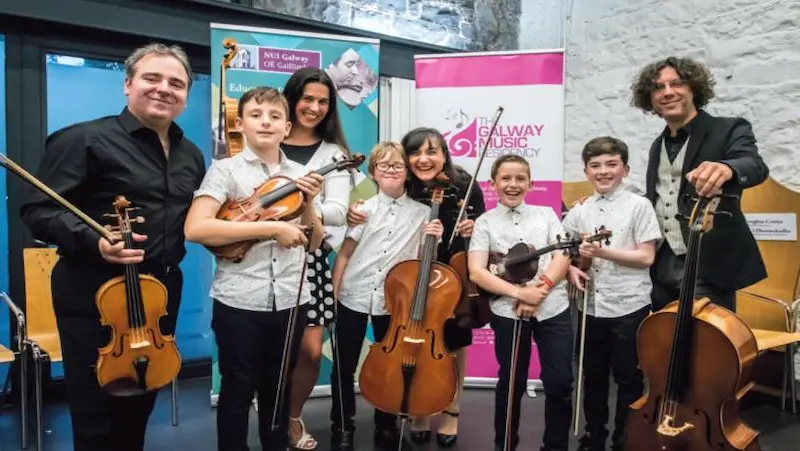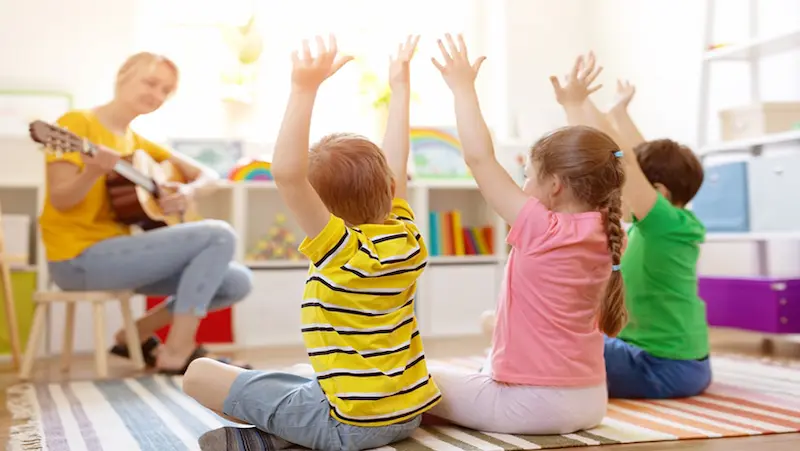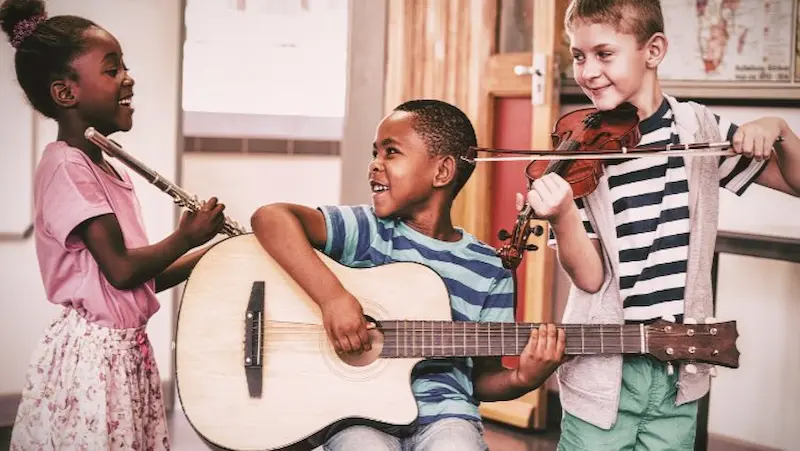Classical music for kids is often considered a timeless treasure, celebrated for its intricate melodies, rich harmonies, and emotional depth. While it may be perceived as a genre reserved for the refined tastes of adults, introducing classical music to children can have profound benefits that extend far beyond their musical education.
This article explores the immense importance and numerous benefits of introducing classical music to kids, emphasizing the positive impact it can have on their overall development and lifelong appreciation for the arts.
Table of contents
Enriching young minds with the timeless melodies of classical music can be an integral aspect of positive parenting. Incorporating it into your child’s routine provides not only enchanting melodies but also valuable parenting advice fostering cognitive development in children through gentle guidance and attachment parenting methods,.
Incorporating classical music into a child’s routine not only introduces them to the beauty of melodies but also serves as a powerful tool for stress management for kids. The soothing compositions can create a calming atmosphere, helping children unwind and relax after a busy day. Its also serves as a powerful tool for stress management for kids. The soothing compositions can create a calming atmosphere, helping children unwind and relax after a busy day.
Discover how to create an engaging and educational environment for your kids with these effective parenting tips, as they explore the captivating world of symphonies, orchestras, and the power of music in shaping their growth.”
Age-appropriate recommendations
Music has the remarkable ability to transcend barriers and touch the depths of our emotions. It can inspire, console, and captivate us, regardless of age. Introducing art for kids like classical music to individuals from a young age can foster a lifelong appreciation for this timeless art form.
In this blog post, we will provide a list of classical compositions suitable for different age groups, ensuring that everyone can discover the magic of classical music at the right stage of their lives.

Early Childhood (Ages 0-5)
For young children, it’s essential to introduce them to classical music in a way that engages their curiosity and imagination. Here are a few age-appropriate compositions to get them started:
1. Wolfgang Amadeus Mozart: “Eine Kleine Nachtmusik”
2. Pyotr Ilyich Tchaikovsky: “The Nutcracker Suite”
3. Sergei Prokofiev: “Peter and the Wolf”
4. Camille Saint-Saëns: “Carnival of the Animals”
5. Ludwig van Beethoven: “Symphony No. 6 ‘Pastoral'”
Childhood (Ages 6-12)
As children grow older, their attention span and understanding of music increase. This age group can delve into more complex compositions while still enjoying playful and vibrant pieces. Here are some recommendations:
1. Antonio Vivaldi: “The Four Seasons”
2. Johann Sebastian Bach: “Brandenburg Concerto No. 3”
3. Georges Bizet: “Carmen Suite No. 1”
4. Ludwig van Beethoven: “Symphony No. 5”
5. Franz Schubert: “Symphony No. 8 ‘Unfinished'”
Teenage Years (Ages 13-18)
During the teenage years, individuals are often more open to exploring new genres and styles. This age group can appreciate compositions that offer emotional depth and complexity. Here are a few classical pieces suitable for teenagers:
1. Johann Strauss II: “The Blue Danube”
2. Claude Debussy: “Clair de Lune”
3. Maurice Ravel: “Boléro”
4. Gustav Holst: “The Planets”
5. Frédéric Chopin: “Nocturnes”
Adulthood (Ages 19+)
In adulthood, individuals have a broader range of musical preferences and can appreciate a wide variety of classical compositions. Here are some recommendations for this stage of life:
1. Ludwig van Beethoven: “Symphony No. 9 ‘Choral'”
2. Wolfgang Amadeus Mozart: “Requiem in D minor”
3. Johann Sebastian Bach: “Mass in B minor”
4. Giuseppe Verdi: “Requiem”
5. Pyotr Ilyich Tchaikovsky: “Symphony No. 5”
Interactive activities
Incorporating classical music into a child’s routine can foster good habits for kids, in a world dominated by screens and digital entertainment, it’s refreshing to engage in interactive activities for kids that bring them together and spark creativity. Music, with its universal language, has the power to connect individuals and create memorable experiences.
In this blog, we will explore a variety of interactive activities centered around music, including music games, DIY instruments, and sing-along suggestions. So, grab your rhythm and let the fun begin!

Music Games
Music games provide an enjoyable way to challenge yourself or compete with friends while expanding your musical knowledge. Here are a few popular options:
a) Name That Tunes: Create a playlist of songs and challenge your friends or family to identify the title or artist as quickly as possible. The person with the most correct answers wins.
b) Musical Chairs: Adapt this classic game by playing snippets of songs instead of using chairs. When the music stops, participants must guess the song and find a seat. The last one standing is eliminated, and the game continues until only one winner remains.
c) Song Association: Choose a word or theme, and take turns naming songs that include that word in their lyrics. It’s a great game to test your music knowledge and discover new songs along the way.
DIY Instruments:
Building your own musical instruments adds an extra layer of excitement and personalization to your music experience. Here are a few DIY instrument ideas:
a) Homemade Shakers: Fill small plastic bottles with beans, rice, or beads. Seal the bottles tightly and decorate them as you please. Shake them to create rhythmic sounds and explore various tempos.
b) Rubber Band Guitar: Stretch rubber bands around an empty tissue box or a cardboard tube to create different pitches. Strum the rubber bands with your fingers or a makeshift pick, and let your creativity flow.
c) Water Glass Xylophone: Fill different-sized glasses with varying amounts of water. Gently tap the glasses with a spoon to produce melodic tones. Experiment by adding or removing water to achieve different pitches.
Sing-Along Suggestions:
Singing brings people together and lifts spirits. Here are a few sing-along suggestions that everyone can enjoy:
a) Karaoke Night: Set up a karaoke machine or use a karaoke app on your phone or computer. Take turns singing your favorite songs and encourage others to join in. It’s an excellent way to showcase your talents or simply have fun.
b) Campfire Songs: Gather around a campfire, or create a cozy atmosphere indoors, and sing popular campfire songs. Classics like “Kumbaya,” “This Land Is Your Land,” and “Leaving on a Jet Plane” is sure to get everyone singing along.
c) Theme Song Medley: Compile a list of famous TV show theme songs and challenge your friends or family to sing along. From “Friends” to “The Fresh Prince of Bel-Air,” relive the nostalgia and showcase your vocal skills.
Educational resources
In today’s rapidly evolving world, access to educational resources is crucial for personal growth and continuous learning. Whether you’re a teacher, student, or someone seeking self-improvement, the abundance of educational materials available can be overwhelming.
To help you navigate through this vast sea of knowledge, we have curated a collection of exceptional educational resources across various domains. In this blog, we will explore music lesson plans, recommended books, and online resources that will inspire and expand your horizons.

Music Lesson Plans
Music is a powerful medium that transcends language barriers stimulates creativity, and enhances cognitive abilities. Here are some excellent music lesson plans that cater to different age groups and skill levels:
a. Smithsonian Folkways Lesson Plans: Smithsonian Folkways offers a comprehensive collection of music lesson plans that explore various genres, cultures, and historical periods. These interactive lessons include activities, listening exercises, and downloadable resources.
b. Carnegie Hall’s Weill Music Institute: Carnegie Hall provides a range of music education resources for teachers and students. Their lesson plans cover diverse musical genres, featuring engaging activities, audio samples, and assessments.
c. TeachRock: Created by the Rock and Roll Forever Foundation, TeachRock offers music-centered lesson plans for all grade levels. Their curriculum connects music with other academic subjects, making learning more enjoyable and interdisciplinary.
Recommended Books:
Books have long been a source of knowledge and inspiration. They allow us to delve into different worlds, gain insights from experts, and explore new perspectives. Here are some highly recommended books that can broaden your understanding and spark intellectual curiosity:
a. “Sapiens: A Brief History of Humankind” by Yuval Noah Harari: This thought-provoking book takes readers on a journey through the history of humanity, exploring our origins, evolution, and the challenges we face today. It offers a unique perspective on the development of civilizations and the impact of our species on the world.
b. “The Power of Now” by Eckhart Tolle: In this transformative book, Tolle emphasizes the importance of living in the present moment and explores how it can lead to inner peace and fulfillment. It offers practical guidance on mindfulness and spirituality, encouraging readers to let go of past regrets and future anxieties.
c. “Educated” by Tara Westover: This memoir tells the powerful story of a woman who grew up in a strict and abusive household in rural Idaho but managed to break free and pursue an education. It highlights the transformative power of learning and the resilience of the human spirit.
Online Resources for Further Learning:
The internet has revolutionized the way we access educational content. Here are some reputable online platforms that offer a wide range of courses, lectures, and resources for continuous learning:

a. Coursera: Coursera partners with renowned universities and organizations to provide online courses on various subjects. From computer science to humanities, you can find courses taught by experts in their fields. Some courses are available for free, while others require a fee for certification.
b. Khan Academy: Khan Academy offers a vast collection of video lessons and practice exercises for K-12 subjects, as well as courses for test preparation and college-level subjects. Their interactive and adaptive learning platform makes education accessible to learners of all ages.
c. TED-Ed: TED-Ed provides a platform for educators and learners to explore and share educational videos and lessons. Their library covers a wide range of topics, presented by experts in captivating animated videos.
Expert advice
Introducing classical music to children can be a rewarding and enriching experience. It not only cultivates a lifelong appreciation for the arts but also enhances cognitive development, creativity, and emotional well-being.
To gain deeper insights into the world of teaching classical music to kids, we decided to interview music educators and professionals who specialize in this field. In this blog, we will delve into the valuable advice and expertise shared by these experts, offering you a glimpse into their teaching philosophies, strategies, and the benefits of exposing young minds to classical music.

The Importance of Early Exposure:
According to our interviewees, early exposure to classical music is crucial for fostering a love for the genre. Starting at a young age allows children to develop an understanding and familiarity with classical compositions, building a solid foundation for future musical endeavors.
Several educators emphasized the significance of incorporating classical pieces into a child’s daily routine, whether it be through bedtime melodies or engaging listening sessions.
Creating Engaging Learning Environments:
One common theme that emerged during our interviews was the importance of creating engaging learning environments. Experts stressed the need to make classical music interactive and fun for children.
Integrating activities like movement, storytelling, and visual aids can capture their imaginations and enhance their overall learning experience. By utilizing innovative teaching methods, educators can pique children’s interest and foster active participation.
Nurturing Creativity and Expression:
Classical music provides an excellent platform for children to explore their creativity and express themselves. Our experts emphasized the role of improvisation and composition in nurturing young musicians’ artistic abilities.
By encouraging experimentation and guiding children in creating their own melodies, educators can empower them to embrace their unique musical voices.
Balancing Structure and Freedom:
While structure is essential in teaching classical music, it is equally important to strike a balance between structure and freedom. Our interviewees highlighted the significance of giving children room for self-expression within a structured framework. This allows them to develop technical skills while maintaining their individuality as budding musicians.
Benefits of Classical Music Education:
Our discussions with music educators reinforced the multitude of benefits that classical music education offers to children. Apart from honing musical skills, exposure to classical music improves cognitive abilities, including memory, concentration, and problem-solving.
It also nurtures emotional intelligence, cultivates discipline, and fosters an appreciation for cultural heritage. Classical music has even been linked to improved academic performance in other subjects.
Parental Support and Involvement:
The role of parents in a child’s musical journey cannot be overstated. Our experts stressed the importance of parental support, whether it is attending concerts, engaging in discussions about music, or providing access to quality learning resources. When parents actively participate, children feel encouraged and motivated to explore classical music further.
User-generated content
In the realm of parenting, every experience is unique, and each child is a canvas waiting to be painted with vibrant colors. As parents, we strive to provide our children with the best opportunities for growth and enrichment.
One such avenue that has proven to be a timeless treasure is classical music. The world of sonatas, symphonies, and compositions has the power to nurture young minds, fostering creativity, emotional intelligence, and a deep appreciation for the arts.
In this blog post, we will delve into the concept of user-generated content and explore how encouraging parents to share their experiences and success stories of introducing classical music to their children can inspire and guide others on this beautiful journey.

The Power of User-Generated Content
User-generated content (UGC) has revolutionized the way we connect and share experiences. It has created a platform for individuals to showcase their unique perspectives, knowledge, and stories, allowing others to benefit from their firsthand encounters.
In the realm of parenting, UGC provides an incredible opportunity for parents to come together as a community, support one another, and exchange ideas. By encouraging parents to share their experiences of introducing classical music to their children, we can build a treasure trove of wisdom and inspiration that benefits both novice parents and seasoned enthusiasts.
Inspiring Curiosity and Creativity
Introducing classical music to children is a gateway to unlocking their imagination. When parents share their success stories, they can ignite the spark of curiosity in others. Parents can recount how their child’s eyes widened in awe upon hearing the delicate notes of a piano, or how their little one started humming a symphony after attending a live performance.
By sharing these anecdotes, parents can inspire others to explore classical music with their children, fostering a sense of wonder and igniting their creativity.
Overcoming Challenges and Sharing Solutions
Every parent faces unique challenges when it comes to introducing classical music to their children. By sharing their experiences, parents can shed light on the obstacles they encountered and the strategies they employed to overcome them.
Whether it’s dealing with a child’s initial resistance to unfamiliar sounds or finding creative ways to incorporate music into daily routines, parents can offer invaluable insights and practical solutions. Through UGC platforms like blogs, forums, or social media groups, parents can find a supportive community that understands their journey and offers guidance when needed.
Enhancing Emotional Intelligence
Classical music has a profound impact on emotional regulation for kids. Sharing success stories of how children connected emotionally with various compositions helps others understand the positive influence of classical music on emotional intelligence.
Parents can highlight instances where their children experienced joy, tranquility, or even sadness while listening to a particular piece. By sharing these stories, parents can encourage others to explore classical music as a means to nurture emotional intelligence, empathy, and self-expression in their own children.
Exploring Diverse Repertoire and Resources
The world of classical music is vast and diverse, encompassing various composers, periods, and genres. By encouraging parents to share their experiences, we can uncover lesser-known composers, hidden gems, and educational resources that can benefit the entire community.
Parents can recommend books, documentaries, or websites that have enriched their child’s musical journey. They can also share their favorite compositions and provide insights into how these pieces resonate with young listeners. The collective knowledge and experiences shared through UGC can become a wellspring of inspiration for parents seeking to explore classical music with their children.
Conclusion
In conclusion, classical music for kids offers a unique and enriching experience that is both engaging and educational. The melodies and compositions from renowned classical composers have stood the test of time, captivating young minds and providing a platform for their intellectual and emotional development.
One of the key benefits of classical music for kids is its ability to stimulate creativity and imagination. The intricate melodies, harmonies, and instrumentation found in classical compositions allow children to explore new sounds and evoke vivid imagery. This can inspire them to think critically, problem-solve, and develop their own artistic expressions.
In a world filled with digital distractions and short attention spans, classical music for kids offers a much-needed respite. It encourages active listening and concentration, allowing children to develop patience and focus. By engaging with complex musical pieces, kids learn to appreciate the value of patience and perseverance, skills that can benefit them in various aspects of life.
In conclusion, classical music for kids is a treasure trove of engaging and educational melodies. Its timeless beauty, intellectual challenges, and emotional depth make it an invaluable resource for children’s development.
By introducing classical music to young minds, we provide them with a window into a world of creativity, critical thinking, cultural understanding, and emotional intelligence. Let us embrace classical music as an essential part of a holistic education, nurturing the minds and souls of our children.
Also, BrightChamps provides a comprehensive platform for learning about money for kids, offering interactive and engaging resources that teach financial literacy, budgeting, saving, and other essential money management skills.
Frequently Asked Questions
A1: Introducing classical music to kids offers numerous benefits, including cognitive development, enhanced creativity, improved concentration, and appreciation for different cultures.
A2: Absolutely! There are plenty of classical pieces specifically composed to engage and entertain children. Our blog features recommendations suitable for various age groups.
A3: Making classical music fun involves incorporating interactive activities, storytelling, and visual aids. Check out our blog for creative ideas to make classical music appealing to children.
A4: Yes, our blog provides a range of educational resources, including music lesson plans, instrument introductions, and recommended reading materials to help you teach classical music to your children.
A5: Studies have shown that listening to classical music can positively impact a child’s academic performance, particularly in areas such as spatial reasoning, language skills, and mathematical abilities.


 We are an army of educators and passionate learners from BrightChamps family, committed to providing free learning resources to kids, parents & students.
We are an army of educators and passionate learners from BrightChamps family, committed to providing free learning resources to kids, parents & students.








